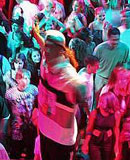专家告诫: 摇头丸“浅尝”亦有恶果
One night of Ecstasy may bring on Parkinson's(2002)
 A single night of taking the drug Ecstasy can cause serious brain damage and hasten the onset of Parkinson's disease, scientists say.
A single night of taking the drug Ecstasy can cause serious brain damage and hasten the onset of Parkinson's disease, scientists say.
Just two to three Ecstasy tablets - a quantity that thousands of clubbers take during raves - can permanently destroy brain cells that affect movement and reasoning, according to American research that links the drug to Parkinson's for the first time.
A study by a team at Johns Hopkins University in Baltimore, Maryland, involving squirrel monkeys and baboons found that both species of primate suffered irreversible damage to key cells called dopamine neurons, which are lost in Parkinson's, after receiving three low doses of Ecstasy at three-hour intervals.
The study is particularly significant because baboons are one of the best animal models for the human brain. George Ricaurte, who led the research, said that widespread abuse of the drug may already be claiming victims of such neurological damage. "The most troubling implication is that young adults using Ecstasy may be increasing their risk for developing Parkinsonism as they get older."
Alan Leshner, a former director of the US National Institute on Drug Abuse, said: "This study emphasises the multi-faceted damage that Ecstasy can do to users. We've long known that repeated use damages serotonin brain cells. This study shows that even very occasional use can have long-lasting effects on many different brain systems. It sends an important message to young people: don't experiment with your own brain."
Janet Betts, the Essex mother whose daughter Leah died after a single Ecstasy tablet in 1995, said: "This comes as no surprise. People can't see the effects at first, and they're in permanent denial, saying it's not going to happen to them. But we'll see the symptoms later, just as we have with smoking."
近日,一些科学家研究发现:"摇头丸"对人体的危害极大。哪怕只有一个夜晚靠它来放纵狂欢,你的脑组织都有可能遭到破坏,甚至还会增加神经系统疾病"帕金森氏症"的发病几率。
最近,美国科学家首次开始研究流行毒品和"帕金森氏症"之间的微妙联系。研究结果显示,那些在酒吧寻求刺激的人们一晚上很容易就能吞掉两三片摇头丸,而这个剂量已经足以对脑部神经控制细胞造成永久性的破坏。
约翰.霍普金斯大学的一个研究小组围绕这一课题,分别用松鼠猴和狒狒为对象进行了实验。研究人员每三小时让研究对象服用一份低剂量的摇头丸,共服用三份。结果发现两种动物脑部一种能治疗脑神经病的多巴胺细胞都遭到了永久性的破坏,而这种细胞的缺乏正是"帕金森氏症"的主要症状。
长久以来狒狒一直是公认的与人类脑部结构最相似的动物,因此我们有理由相信这个实验的结果正向人类敲响警钟。该实验的负责人乔治·考特亚涅斯说:"目前正在享受摇头丸的大多数人都有可能已经惹祸上身了。而对于现在的年轻人来说,也许年纪越大,这样的危害才会越发的明显。"
前美国国家药品滥用研究所(NIDA)主任艾伦·雷辛勒指出,这一实验强调了摇头丸对使用者的全方位伤害。传统观念一直认为只有长时间服用毒品才会破坏脑部官能,而这次的研究结果显示,很偶然的服用一次也有可能使脑神经受到永久性伤害。这也告诫人们:千万不要用"以身试药"。
1995年,英国艾塞克斯郡曾有一个女孩子死于服用摇头丸,但她只吃了一次。她的母亲珍妮特·贝茨日前谈了对实验结果看法,她说:"我(对这一结果)丝毫不感到吃惊。人们往往习惯于用自我安慰来麻痹自己,认为最坏的结果不可能发生在自己身上。但就象抽烟一样,危险始终存在着,爆发的那一刻早晚会到来。"